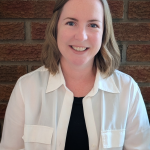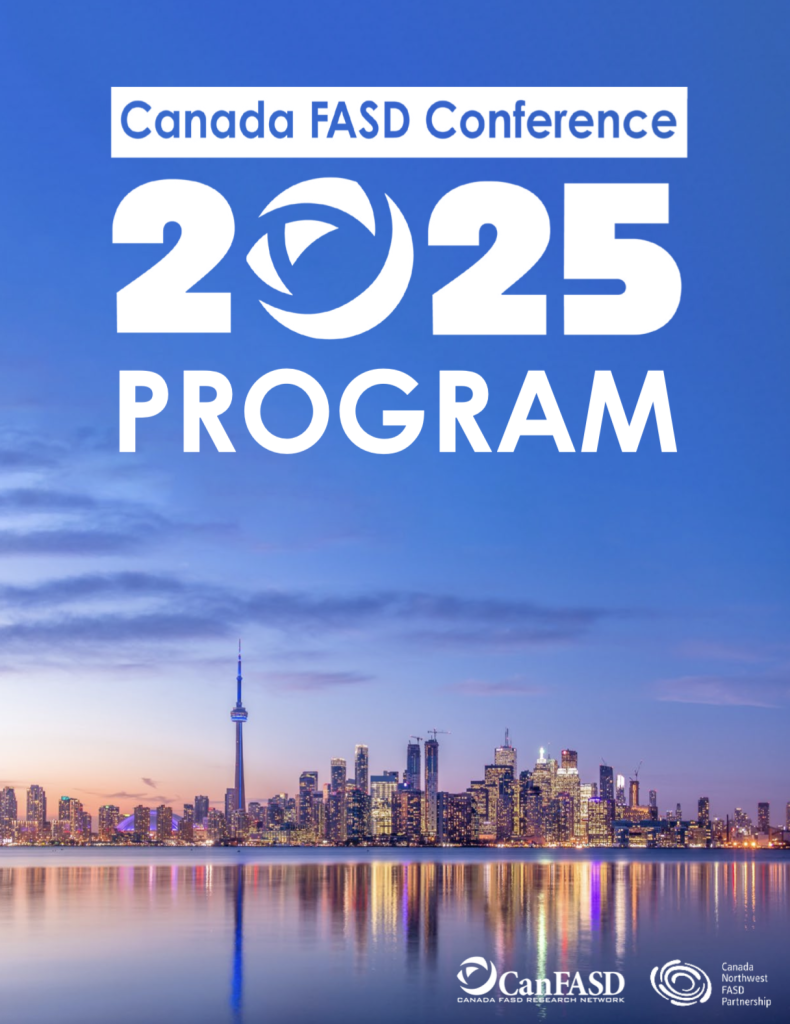2025 Conference Program at a Glance
The tentative program for the 2025 Canada FASD Conference has been released! All presentations and times listed within are tentative and may be subject to change. Please check back in October for the full conference program. Check out the conference website for presentation descriptions and speaker bios.
Conference Schedule
Tuesday, October 21, 2025
Morning
7:30-8:30 Light Breakfast
8:30-10:00 Opening Remarks & Plenary
10:00-10:30 Coffee Break
10:30-12:00 Concurrent Session A
Afternoon
12:00-13:15 Lunch
13:15-14:45 Concurrent Session B
14:45-15:15 Coffee Break
15:15-16:45 Concurrent Session C
Evening
17:00-18:00 Poster Viewing & Judging
Wednesday, October 22, 2025
Morning
7:30-8:30 Light Breakfast
8:30-10:00 Morning Meeting & Plenary
10:00-10:30 Coffee Break
10:30-12:00 Concurrent Session D
Afternoon
12:00-13:15 Lunch & Live Interview with Jeff Noble
13:15-14:45 Concurrent Session E
14:45-15:15 Coffee Break
15:15-16:45 Concurrent Session F
Evening
17:00-19:00 Networking Night & Film Festival
Thursday, October 23, 2025
Morning
7:30-8:30 Light Breakfast
8:30-10:00 Concurrent Session G
10:00-10:30 Coffee Break
10:30-12:30 Plenary & Closing Remarks
Registration is now open for the 2025 Canada FASD Conference!
Conference Speakers
Keynote Speakers
The Right to Thrive: FASD, Equity, and Human Rights in Canada
Tuesday October 21, 2025 at 8:30am
We don’t talk enough about Human Rights and FASD. This plenary will highlight the role Human Rights can play in our lives, the state of those rights in Canada, and the impacts it can have. This is a key opportunity to elevate the conversation around rights, equity and systemic change.

Melissa Dobson
Melissa is a parent of three children, all adopted at birth, all prenatally exposed to alcohol and all amazing. She holds a PhD in biochemistry where she discovered genes involved in Vitamin B12 metabolism. From scientific bench work, she went on to expand her horizons as she realized she needed to shift her career so she could support her children while also pursing her career. For over a decade, she has ben an instructor at a polytechnic institute in a Bachelors of Technology Management program. Combining her passions of teaching, learning and supporting families like hers, she is embarking on a life that blends these three roles. She has various student projects that help support children with disabilities, including those with FASD; she keeps learning and thinking and trying ways to redesign systems for supports; and she is involved in numerous organizations and committees to support children with neurodevelopmental delays. All these are efforts to try and shift the needle for children like hers to flourish.

Krista Carr
Krista Carr is a long-time advocate in the inclusion movement. She is the Chief Executive Officer (CEO) of Inclusion Canada, a national federation working on behalf of Canadians with a developmental disability and their families. Krista has over 30 years of experience in the non-profit sector as a champion of inclusion. Before joining Inclusion Canada, she was the Executive Director of the New Brunswick Association for Community Living (NBACL). In addition to her extensive work portfolio, Krista sits on a number of provincial and national disability-related boards and committees, including the chair of the federal government’s Minister’s Disability Advisory Group (MDAG).
Krista is a graduate of the University of New Brunswick (UNB) where she earned a Bachelor’s in Business Administration (BBA) and several diplomas in Human Resources and Management from UNB’s College of Extended Learning. In 2023, Krista was awarded the Queen’s Platinum Jubilee medal and the King’s Coronation Medal in 2025 for her many years of advocating for a Canada where everyone belongs. She currently resides in New Brunswick with her husband and two daughters.

Christopher T. Sutton
Christopher T. Sutton was appointed Accessibility Commissioner at the Canadian Human Rights Commission in May 2025. Mr. Sutton’s work is influenced by both his professional expertise and lived experiences of advocating for accessibility as a fundamental human right in Canada. Before his appointment to the Commission, Mr. Sutton served as the Chief Executive Officer of Wavefront Centre for Communication Accessibility, where he spearheaded initiatives focused on hearing healthcare, accessible communication, and inclusive technology solutions. Under his leadership, Wavefront Centre significantly expanded its programs and services, strengthened strategic relationships, and emerged as a national leader in communications accessibility. A recognized thought leader in inclusion, diversity, equity, and accessibility, he has also held leadership roles across the not-for-profit, public, and start-up sectors in both Canada and the United States.
Throughout his career, Mr. Sutton has worked closely with disability communities to ensure that accessibility policies are intersectional and inclusive. He has played a significant role in shaping Canada’s accessibility policies and legislation at both the federal and provincial levels, including the Accessible Canada Act and the Accessible British Columbia Act. Originally from St. John’s, Newfoundland and Labrador, Mr. Sutton holds a Bachelor of Arts in Political Science from Gallaudet University and an MBA from the Ivey Business School at the University of Western Ontario.

Christian Whalen – Moderator
Christian Whalen is a native of Fredericton and holds degrees from Carleton University (BA ’87); the University of New Brunswick (LLB ’89) and from l’Université de Strasbourg III (D.E.A. ’92). Following his call to the bar, Christian worked as a lawyer in private practice and as legal counsel to the New Brunswick Human Rights Commission before joining the Office of the Ombudsman in 2005. He has been responsible for systemic investigations and acted as lead investigator on several reports of Ombudsman and the Child and Youth Advocate. He was also the project lead on the Advocate’s annual State of our Children and Youth reports and annual Children’s Rights and Well-being Framework. He served as Acting Child and Youth Advocate for New Brunswick from April 1, 2011 to August 1, 2013, during which he developed an International Summer Course on child rights, a child rights data monitoring framework and a child rights impact assessment process for New Brunswick. He served as founding chair of the Canadian Bar Association’s National Sections Council Committee on Children’s Law and initiated the development of their online Child rights toolkit. In 2014 he received the Children’s Rights Champion Award from the Canadian Coalition for the Rights of Children and in 2015 was awarded the John Tait Award for distinguished service as public sector counsel by the Canadian Bar Association.
Think it’s all trauma? Think again!
Wednesday October 22, 2025 at 8:30am
Individuals with PAE disproportionately experience adversity and trauma. Yet our understandings of the impact of this adversity is lagging – which impacts our ability to implement effective, well timed and feasible intervention. In this presentation panelists will provide an overview of current work examining effects of adversity on individuals with PAE and FASD. Consideration for unexpected results, nuanced interpretation, and further inquiry will be provided. Ultimately the panel will identify future directions for the field and emphasize need for collaborative approaches that leverage shared initiatives and inform practices.

Dr. Raja Mukherjee
Professor Raja Mukherjee is an Adult Learning Disability Consultant Psychiatrist for Surrey and Border’s Partnership NHS Foundation Trust, with interest in the management of developmental disorders across the lifespan. In September 2009 he started the first NHS based specialist Fetal Alcohol Spectrum Disorders behavioural clinic and since then has seen over 250 cases for specialist second opinion as a National referral service. Dr Mukherjee completed his PhD on the subject of Fetal Alcohol Syndrome in 2014.
He has also acted as an invited advisor to the BMA board of science, The Department of Health and the World Health Organisation on the subject of FASD. In 2015 Prof Mukherjee also gave evidence to the first All Party Parliamentary Group on FASD at the House of commons. He has continues to support national clinical developments related to FASD. Dr Mukherjee is a member of the NICE quality standards group for FASD. He is currently the only UK representative to a US, NIH sponsored initiative to consider the research criteria for FASD. In his own time he volunteers as a medical advisor to various FASD charities both in the UK and internationally. In 2021 he was made an Honorary Professor at the University of Salford related to his work on FASD.
In wider work, he is currently Clinical Lead for Adult neurodevelopmental services provided by Surrey and Borders including Adult ASD and ADHD services across Surrey. He is a an executive committee member and Finance Office of the RCPsych SIG on neurodevelopmental disorders, and an Executive member of the ID Faculty.
Prof Mukherjee was awarded an MBE for his work related to FASD in the Kings Birthday Hours list in June 2023

Dr. Alan Price
Dr. Alan Price is a Lecturer in Psychology at the University of Salford in Greater Manchester, UK, whose main research interest is fetal alcohol spectrum disorder (FASD). His PhD thesis was on the additional impact of childhood trauma on cognitive and behavioural functioning in children with FASD. He is currently working with colleagues at the University of Salford and in the NHS and charity sector to develop and test a training programme for parents and carers of children with FASD, called SPECIFiC. He was involved in the first piece of research to estimate the prevalence of FASD in the UK, which was conducted in Greater Manchester. Alan is a founding member of the UK FASD Research Collaboration, and he is a member of the Professional Advisory Panel for Irish FASD charity EndPAE. Alan regularly delivers training and talks on FASD to academics and other professionals, families affected by FASD, the general public, and students. He is also part of a group that delivers a regular one-day training event on FASD for paediatricians hosted by the Royal College of Paediatrics and Child Health. Alan’s published works include journal articles, magazine articles and book chapters.

Dr. Carly McMorris
Dr. Carly McMorris is an Associate Professor in the School and Applied Child Psychology program at UCalgary’s Werklund School of Education and a Canadian Research Chair (Tier II) in Neurodiversity and Mental health. She is the director of the ENHANCE Lab and a registered child clinical psychologist. Dr. McMorris’ research and clinical practice focuses on advancing mental health outcomes for neurodivergent youth and young adults, such as those with autism, intellectual disability, and fetal alcohol spectrum disorder. Her research determines the underlying causes of their increased risk for mental health challenges and develops evidence-based treatment and prevention strategies to promote positive outcomes. She is a leading expert in suicidality in neurodivergent youth and young adults. Her collaborative network includes national and international researchers, community organizations, and individuals with lived experience, highlighting her commitment to creating impactful, real- world solutions. Dr. McMorris’ work is funded by national and international agencies, such as Canadian Institutes of Health Research, New Frontiers Research Fund, and the American Foundation for Suicide Prevention. She has over 90 peer-reviewed publications in high impact journals, and she has received highly competitive national research awards, including a Killam Early Research Leader Award, Kids Brain Health Network Early Career and Mentorship Award, and Avenue magazine’s Top 40 Under 40. As a psychologist, Dr. McMorris has decades of experience in working with neurodivergent children, youth and young adults, and their families to promote their mental health to ensure they can thrive in adulthood.

Shana Mohr
Shana is the Training Manager for the FASD Network of Saskatchewan. She has trained hundreds of professionals, caregivers, and individuals with intellectual disabilities about the complexities of FASD. Through her experiences, she has developed an intimate understanding of the services available for individuals with FASD. Shana believes in the need for more research to fill the gaps in these services and to increase the accessibility for individuals with FASD and their caregivers. Shana is also the mom to an amazing daughter with FASD and motivates her unlimited passion for the cause. She is where Shana’s dedication started and continues to be her most important teacher in the complex world of FASD.

Dr. Jaqueline Pei – Moderator
Jacqueline Pei is a Professor in the School and Clinical Child Psychology Program and Assistant Clinical Professor in the Department of Pediatrics at the University of Alberta. Also a practicing Registered Psychologist for over twenty years, Dr Pei began her career as a criminologist and forensic counselor working with incarcerated youth. Motivated by this early work, she returned to academia to study youth at risk, child development, and neuropsychology, leading to her current focus on interventions for individuals with Fetal Alcohol Spectrum Disorders. Dr Pei has over 150 peer reviewed publications, but places the greatest value on her work with various community and government agencies. To this end, Dr Pei currently leads the Intervention Network Action Team (iNAT) for the Canada FASD Research Network, a role that facilitates the link between research, policy, and practice.
Navigating Self-Care and Recovery with the Pinkifying of Alcohol Marketing
Thursday October 23, 2025 at 10:30am, sponsored by Health Nexus
Understanding the factors that contribute to alcohol use in pregnancy is important. While some factors associated with prenatal alcohol use include histories of substance use, trauma, or violence, other factors point to peer pressure, the normalization of alcohol and the ways in which the alcohol industry has increasingly targeted new products and marketing towards women. In this plenary presentation, internationally recognized researchers and women’s health advocates will speak to how the alcohol industry has ‘pinkified’ products and how women have responded and even rejected these marketing tactics with their own movements that push towards low- or no-alcohol use or sobriety. The presenters will share empowering strategies for health promotion and self-care that support healthy pregnancies and healthy beginnings.

Dr. Kelly Harding
Dr. Kelly Harding (she/her) is an interdisciplinary feminist women’s health and disability scholar. She received her PhD in Interdisciplinary Rural and Northern Health from Laurentian University in Sudbury, Ontario, Canada. Kelly is the Director of Research Administration and a Research Associate with the Canada FASD Research Network. She is also an Adjunct Faculty member in the School of Liberal Arts and the School of Kinesiology and Health Sciences at Laurentian University. She has worked in the field of FASD since 2010 and is involved in diverse research projects in the areas of FASD prevention and women’s health, FASD assessment and diagnosis, family well-being, social media, mental health, and human rights.
Affiliations:
- Canada Fetal Alcohol Spectrum Disorder Research Network, Vancouver, BC, Canada
- Department of Psychology, School of Liberal Arts, Laurentian University, Sudbury, ON, Canada
- School of Kinesiology and Health Sciences, Laurentian University, Sudbury, ON, Canada

Dr. Dawn Nickel
Dr. Dawn Nickel is a healthcare policy expert, consultant, and thought leader in the North American recovery movement. With over 30 years of experience in research, policy development, and systems change—focused on mental health, addiction, intimate partner violence, and trauma-informed care—she brings a deep understanding of how to build meaningful, sustainable support systems for people in recovery. Dawn holds a PhD in health policy and has advised governments, corporations and nonprofit organizations across North America. She is also a Certified Professional Recovery Coach and the founder of the SHE RECOVERS® Foundation, a nonprofit dedicated to supporting women in or seeking recovery. A sought-after speaker, Dawn blends professional expertise with lived experience to offer practical, compassionate insight into how individuals and workplaces can promote better mental health, reduce stigma, and build cultures of resilience.
Affiliations: She Recovers Foundation

Ashley Wettlaufer
Ashley Wettlaufer is a Research Methods Specialist with the WHO Collaborating Centre for Addiction and Mental Health at CAMH in Toronto. She has led data collection and analysis for the Canadian Alcohol Policy Evaluation (CAPE) project since 2012 and, together with her WHO colleagues, tracks alcohol consumption worldwide in support of WHO global monitoring activities. With over 15 years of experience researching the impacts of alcohol policy, Ashley has advised Canadian and international governments on the development of evidence-based alcohol policies. Her research interests include the impacts of alcohol pricing and taxation, availability, and marketing, as well as the effectiveness of alcohol warning labels.

Dr. Amanda Marie Atkinson
Dr. Amanda Marie Atkinson is a Reader in the Sociology of Public Health, at Liverpool John Moores University in the UK. Her research predominantly relates to (gendered) drinking cultures, (gendered) substance use, and the role and influence of media and marketing on consumption, public perceptions and policy formation. She was recently Principle Investigator on an ESRC grant which explores the nature, creation, impact and regulation of gendered alcohol brand and nightlife marketing in the age of contemporary feminism(s) and social activism. The project considers the role of brand and venue marketing that reproduces gender stereotypes and the sexualization of women, as well as the use of ‘social cause’ marketing which is said to promote equality, on identity making and experiences of drinking and the nighttime environment. Her general research interests relate to consumption and identity, media representations, commercial determinants, and gender relations.

Lindsay Wolfson – Moderator
Lindsay Wolfson (she/her), is a public health researcher and consultant who has worked in Canada and internationally on a broad range of women’s health issues. She holds a Master of Public Health, Social Inequities and Health, from Simon Fraser University and is currently completing her Master of Social Work at Wilfrid Laurier University. Lindsay has over 10 years of experience working in anti-violence, anti-trafficking, substance use, chronic pain, sexual health, and women’s health policy and practice. Lindsay is the Manager at the Centre of Excellence for Women’s Health where she is responsible for research, collaboration, and knowledge mobilization on projects relating to perinatal substance use, chronic pain, and Indigenous health and wellness.

